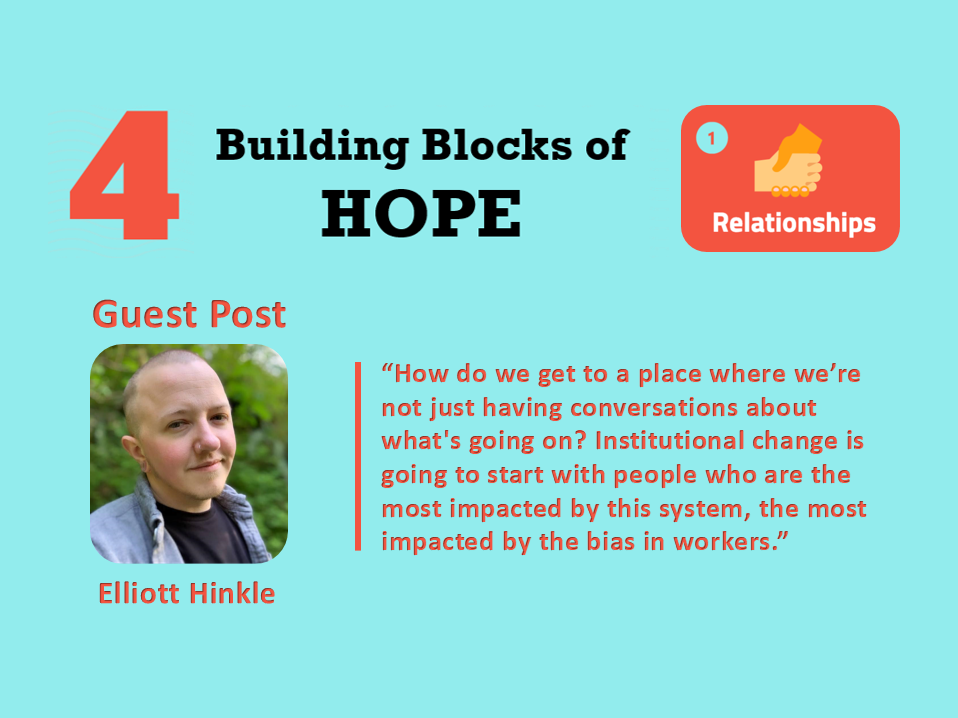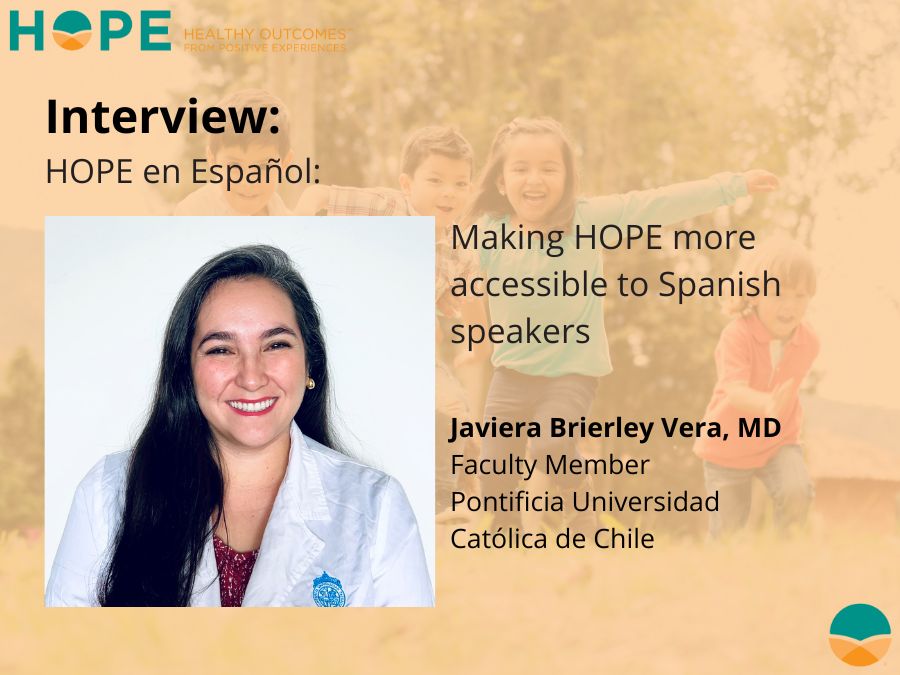
Today’s post is based on an interview with Elliott Orrin Hinkle (they/them), an alumnus of the Wyoming Foster Care System. They are an advocate for child welfare, mental health, and the LGBTQ population. Nationally they work as a consultant to the National Capacity Building Center for States at ICF International and at JBS International working on NYTD. Since 2014 they have been a trainer of Youth Thrive and recently were certified to train on Youth Thrive for Youth (click here for their TED talk at the 2019 Youth Thrive convening). They are also working on an LGBTQ+ youth project, XChange for Change, which connects youth leaders with corporate and business allies.
Can you introduce yourself and your work?
My name is Elliott Hinkle, I use they/them pronouns, and my primary job is at Portland State University as the youth/young adult coordinator on the Healthy Transitions grant, a youth mental health grant funded by SAMHSA. I also work as a consultant on youth-specific issues, where I focus on youth work: LGBTQ youth, mental health related to young people, and foster care.
How does your personal experience in foster care inform the work you do?
I entered foster care in Wyoming by seeking it out, knowing that the family I grew up with just wasn’t able to meet my needs. This informed my work, particularly in foster care and with young people; I want to make sure they get access to the opportunities that I stumbled into. My experience has really shifted how I interact with the young people I work with. I try to not only think about whatever task we’re working on, but be in a mentor/supportive adult role, because those people in my life are what changed my trajectory. I really think about lived experience in the work I do. I bring that voice in, because it can get easily stripped away from the work that we’re doing.
Can you talk more about the people who helped you in the foster care system?
There were adults who went above and beyond the professional job, really cared about me, and showed that. We were able to have conversations that felt genuine and raw. I could ask questions of these adults that I wasn’t getting from family. Having adults in my life who took the time to be human with me was super informative to how I work with young people and determine what is beneficial in the work. Like when we get a little too afraid to talk about love – love doesn’t have to be a dangerous thing. It’s really hard to do some of this work and not acknowledge that there is a certain amount of love that goes into caring about people.
What other positive experiences in your life helped you succeed?
Relationships were huge. When I went into care, I was going to school with people who were having very different experiences at home than I was. One of my friends’ mom had previously been an attorney, and they used the connections they had to get in touch with someone who was going to make sure I could get into care, in a way that I was a part of, rather than happening to me. They [my friend’s family] didn’t just try to get me in care and then disappear; they also let me live with them for the summer. It was a huge amount of generosity and care. They were the same people who also helped me learn to advocate for having an attorney who actually supported my needs.
The other positive experience was multidisciplinary team meetings. I was sitting at a table with adults, and the point of the meeting was to talk about me. That was a space where I was suddenly met with a contingent of folks who cared about my success. I realized, I need to rise to that occasion if they’re going to do all this work for me.
You are a very strong advocate for child welfare and the LGBT population. What can be done to promote positive child experiences in this population with higher rates of ACEs than their cisgender and heterosexual counterparts?
I think training won’t solve everything, but I went to a training led by The Family Acceptance Project, and what I appreciated was that it felt like it was accessible to anyone. There were moments in the video that felt uncomfortable, but it was also like, “This is going to get someone to think differently about their young person.” People need to be more curious about the things they don’t understand, because by not taking the time to learn, they contribute to young adults wanting to end their lives as queer youth. They have no one around them that feels supportive, so finding positive experiences to look back on in their lives, let alone think [positive experiences] are going to come in the future, is really hard. I didn’t have people around me a lot of the time who looked like what I wanted to look like or had relationships I wanted to have. It was really hard to imagine being the person I am now. If young people don’t have access to supportive adults who genuinely care, who are willing to do the learning, then that will just continue.
How can talking to kids openly and teaching them to talk about their feelings yield healthy outcomes?
There was a young person I was working with who was an immigrant. He had a dentist appointment, and the person at the counter was like, “How did you get here?” She was definitely not asking, like, “Did you take a taxi here?” It was racist, but it wasn’t on the surface. He [the youth] told me later what happened. We had to slow the conversation down to, “What you just experienced is racism. What does that mean to you? What does that feel like?” The conversation felt scary and hard for me, but I was realizing that we needed to talk about the very real aspect of what he experienced. If we didn’t, that might normalize the experience, and I didn’t want to co-sign the behavior of the dentist office, either.
There were often times when the plan was to do a worksheet, but they would tell me about something frustrating that happened, so we’d talk about that instead. It was about helping youth figure out how to navigate racism or transphobia or all these things. “How do we learn to buffer it and still feel good about ourselves?” I just want to make sure they know, “I value you, and I know other people will value you. Disregard the negative voices and just keep building up the positive ones”.
What improvements do you think could better the system?
I was having a really interesting conversation yesterday about race and foster care. There was a blind study where researchers took out all the demographic data, and the amount of removals [from Black families] was the same as White folks. How do we get to a place where we’re not just having conversations about what’s going on? A lot of foster care workers are White people who aren’t having those conversations, who have a degree behind them, so they may feel they know what’s best. I think of how many committees exist around diversity, equity, and inclusion, but not an accountability structure for when someone does something harmful. If a family or youth wants to speak up, that doesn’t really exist. What do we actually do about that? When the same people who are going to hold a White person accountable are more White people, nothing’s going to happen there.
Institutional change is going to start with people who are the most impacted by this system, the most impacted by the bias in workers. A positive thing that can happen is shifting the system, so the people who are at the top have had the most direct experience – their community is much more represented. I think it could look like involving youth in meaningful conversations, in authentic ways, not just a seat, because younger generations continue to show that they actually have really great ideas.
Also, when I think of child welfare, child welfare’s intentions were to help families, to reunite families, to navigate child abuse, but ideally, if child welfare was doing what I thought it should be doing, we would be working ourselves out of a job. We wouldn’t continue serving families in the sense of, “We know this is going to continue to be an issue,” we’d be working towards, “How do I keep the youth in the family? How do I make sure that I’m collaborating with a culturally specific, responsive service provider? What does the community think the solution is?” Versus, “I have the ideas, this is what we’re going to do.”
Can you connect the child welfare system with the current reconsideration of what public safety means?
One thing I heard was, “What if we defund the police and then we put social workers everywhere.” Social workers are complicit in this system also. There are great social workers out there, some of them do great work and also aren’t willing to say, “I’ve probably caused harm.” We all have. If we can’t acknowledge the harm we’ve caused, we are not going to move forward. How many social workers are serving a community that doesn’t look like them, but they’re doing it because it was a job? Why didn’t someone else take that job? More people should think consciously about, “Where should I be serving people or giving up space?”
Can you connect that to the importance of genuine relationships in youth’s lives?
If a White case worker is working with a Black youth, they might be able to do some good work. But if a young Black man is in foster care, and has a Black case worker or mentor, the amount of things that young person is going to get out of that positive relationship and seeing themselves represented will look really different. Somebody was saying that they were raised as a little boy to see their own fellow Black people as scary, but they were also like, “I know that’s not true, because I’m in that community.” If you’re not met with people who can disprove what society is telling you, you’re just going to buy into that, too.
You mentioned healthy outcomes being yielded from mentors who understand where youth are coming from. Has there been a shift in inclusion of LGBTQ+ couples as foster parents?
I remember there was a gay couple around town in my hometown in Wyoming, and then seeing them at this foster parent event, and being like, “They’re queer, they’re fostering young people, and everyone here doesn’t seem to be batting an eye about it.” At that moment, I was like, “Maybe we just don’t talk about it, but it is happening. That’s good to know.” Inclusion is happening in pockets, but maybe you just don’t know about it because people aren’t advertising it. But, we can always use more foster parents, and LGBTQ+ folks are just as capable of supporting young people and being their family!
This interview was conducted, transcribed, and compiled by Yasaman Salon, Esther Sokoloff-Rubin, and Chloe Yang.


